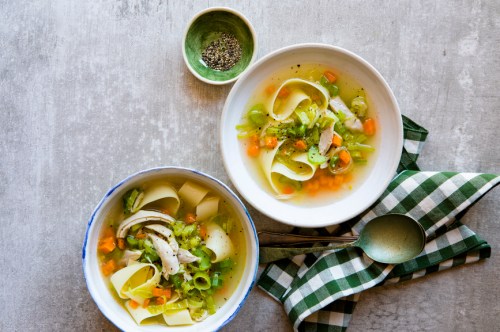Yes, There is a Science-Backed Reason Why Chicken Soup Makes You Feel Better
A dietitian shares the science-backed reasons that eating chicken soup for colds and other forms of sickness can actually be restorative.

When the winter chills manage to get to your bones and the seasonal sniffles set in, we turn to our weighted blankets, our wool socks, and of course, the most curative of all: a big bowl of chicken soup. We respect the fact that cold medications, fluids, rest, and the like have (ahem, a lot) more to play in maintaining one’s health when under the weather, but it’s hard to argue with the fact that a warm bowl of chicken soup is restorative. And while you may assume that it’s simply the comforting nature and delicious taste of chicken soup that can help cure what ails you, it turns out that there are actually a few science-backed reasons why eating chicken soup for colds and other pesky winter weather ailments helps you feel better.
To better understand the nutritional value of this crowd favorite and the why it’s the best soup when sick, we chatted with Lon Ben-Asher, MS, RD, LDN, a nutritionist at Pritikin Longevity Center. “Chicken soup has long been thought of as a remedy for a cold or respiratory virus,” says Ben-Asher. “Many would categorize it as extremely comforting due to its warmth, ease of consumption, and the ingredients used to make it.”
According to Ben-Asher, the ingredients used in chicken soup combined with the steam that the warm broth releases both help to clear your sinuses, boost your immune system, and generally get you feeling more like your chipper self. Food is energy, after all. “Typically, homemade chicken soup is produced utilizing a mirepoix consisting of carrots, celery, and onion included with chicken, water, and garlic,” Ben-Asher notes. “Every single one of these foods provide your body with a potent punch of nutrients.” Read on for more details on what health benefits you reap from all of the above.
Why is chicken soup for colds *actually* effective? It’s all in the ingredients.
1. Chicken
Chicken, a lean white meat, comes with plenty of nutritional benefits. “Chicken is an excellent source of protein, iron, zinc, and certain B vitamins,” says Ben-Asher. “Specifically, zinc is a mineral that plays a very important role in our immune system which helps fight off colds, viruses, and other invaders.” Protein also helps to repair and produce cells, which is why it’s so crucial to muscle growth and cell development.
2. Carrots
There’s a good reason that your parents always forced your vegetables on you as a kid, especially carrots. “These root vegetables are an excellent source of a photochemical beta-carotene. When converted to its active form of vitamin A, beta-carotene acts like an antioxidant that strengthens and supports our immunity,” explains Ben-Asher.
3. Celery
The celery juice craze is more than just an Instagram influencer-backed health-booster. Rather, celery has a number of unique properties that are good for the human body. One of them, says Ben-Asher, is in celery’s provision of “an endogenous source of sodium, which helps keep our electrolytes at normal levels to prevent dehydration.” This is especially important when you’re feeling under the weather.
4. Garlic
The antioxidants in garlic far outweigh the potentially bad breath that you (or your loved ones) may have to suffer after eating a garlicky meal. These antioxidants, Ben-Asher notes, are key to improving your immune response—both before and during illness. Onions also pose similar benefits for the immune system and can be consumed in the form of onion water for a quick and easy boost.
5. Water
Of course, few soups can be made without this crucial ingredient, and no bodies can function without it either. “Water is imperative to consume in order to keep the body hydrated and helps transport vitamins and minerals throughout the body to be utilized in support of our immune system,” says Ben-Asher.
Taken as a whole, these ingredients can provide a line of defense against colds and viruses that may be more effective than over-the-counter medications alone, Ben-Asher says. However, there are certainly caveats to be noted. “For one, the health-boosting effect may not be as valuable with highly-processed, packaged commercially-available chicken soup. Many of these products are very high in sodium and contain a high amount of saturated fats which can produce more of a pro-inflammatory response and thus weaken the immune system,” he says.
As such, if you’re hoping to improve your immune system with chicken soup, be sure that it’s the homemade kind. “Chicken soup made from scratch is low in sodium, low in fat, and is rich in nutrients that are essential to our immunity,” Ben-Asher notes. “Get the comfort from the warmth and delicious natural flavors, stay hydrated with the fluids, and receive all the nutritional benefits from the ingredients that make up the soup. The only side effect is potentially bliss and wellness.” We’re sold. Pro tip: You can up the ante with the help of these anti-inflammatory spices for chicken soup.
Oh hi! You look like someone who loves free workouts, discounts for cutting-edge wellness brands, and exclusive Well+Good content. Sign up for Well+, our online community of wellness insiders, and unlock your rewards instantly.
Sign Up for Our Daily Newsletter
Get all the latest in wellness, trends, food, fitness, beauty, and more delivered right to your inbox.
Got it, you've been added to our email list.










